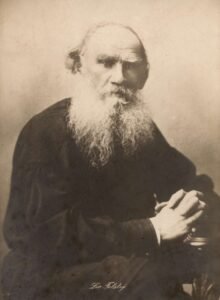Books By Leo Tolstoy
- Childhood (1852) – Childhood, Boyhood, Youth series
- Boyhood (1854) – Childhood, Boyhood, Youth series
- Youth (1856) – Childhood, Boyhood, Youth series
- War and Peace (1869) – standalone
- Anna Karenina (1877) – standalone
- The Death of Ivan Ilyich (1886) – standalone
- The Kreutzer Sonata (1889) – standalone
- Resurrection (1899) – standalone
About Leo Tolstoy
 Leo Tolstoy, born on September 9, 1828, in Yasnaya Polyana, Russia, was a prolific Russian writer widely regarded as one of the greatest novelists in world literature. Tolstoy’s literary legacy encompasses a diverse range of works, including novels, novellas, essays, and philosophical treatises, all marked by his profound insights into the human condition and his deep moral and spiritual convictions.
Leo Tolstoy, born on September 9, 1828, in Yasnaya Polyana, Russia, was a prolific Russian writer widely regarded as one of the greatest novelists in world literature. Tolstoy’s literary legacy encompasses a diverse range of works, including novels, novellas, essays, and philosophical treatises, all marked by his profound insights into the human condition and his deep moral and spiritual convictions.
Tolstoy’s early life was shaped by the aristocratic privilege of his upbringing, but he later rejected the trappings of wealth and social status in favor of a simpler, more austere way of life. His experiences as a young man, including his service in the Crimean War and his travels throughout Europe, deeply influenced his worldview and his writing.
Tolstoy’s literary career took off with the publication of his first novel, “Childhood,” in 1852, followed by “Boyhood” in 1854 and “Youth” in 1856, collectively known as the Childhood, Boyhood, Youth trilogy. However, it was his epic novels “War and Peace” (1869) and “Anna Karenina” (1877) that cemented his reputation as a master storyteller and earned him international acclaim.
“War and Peace,” Tolstoy’s magnum opus, is widely regarded as one of the greatest novels ever written. Set against the backdrop of Napoleon’s invasion of Russia, the novel explores themes of war, politics, and society, while delving into the lives of a rich and diverse cast of characters.
“Anna Karenina,” another towering achievement in Russian literature, is a tragic tale of love and betrayal set in 19th-century Russia. Through the story of the doomed love affair between Anna Karenina and Count Vronsky, Tolstoy explores complex themes of morality, desire, and the search for meaning in life.
In addition to his fiction, Tolstoy was also a prolific essayist and philosopher, writing extensively on topics such as religion, ethics, and social justice. His spiritual awakening in mid-life led him to embrace pacifism, vegetarianism, and a radical interpretation of Christianity that emphasized nonviolence and the rejection of material wealth.
Tolstoy’s later years were marked by his increasing preoccupation with moral and philosophical questions, as well as his advocacy for social reform and humanitarian causes. He became a figurehead of the Russian literary scene and a revered voice of conscience, inspiring generations of writers and thinkers around the world.
Leo Tolstoy’s profound insights into the human soul, his keen observations of society, and his timeless storytelling continue to resonate with readers across cultures and generations. His legacy as a literary giant and a moral visionary endures, reminding us of the power of literature to illuminate the complexities of the human experience and to inspire us to strive for a more just and compassionate world.

